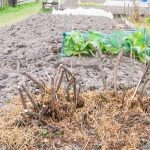Are you wondering, “Will hardware cloth contaminate soil in vegetable gardens?” When it comes to protecting your vegetable garden from pests and critters, hardware cloth is a popular choice. However, there are concerns about the potential impact on soil quality. This article will address the importance of using hardware cloth in vegetable gardens while considering the risk of soil contamination.
Hardware cloth is a versatile material used for garden fencing and protection. It serves as an effective barrier against rodents, rabbits, and other unwanted visitors to your vegetable garden. Understanding what hardware cloth is and how it can affect the soil is crucial for any gardener looking to maintain a healthy environment for their plants.
While hardware cloth provides excellent protection for vegetable gardens, there are potential concerns regarding contaminants leaching into the soil. Some materials used in manufacturing hardware cloth may pose risks to soil quality and plant health. In this article, we aim to explore these concerns and provide valuable insights for gardeners seeking to make informed decisions about using hardware cloth in their gardens.
What Is Hardware Cloth?
Hardware cloth, also known as wire mesh, is a versatile material commonly used in vegetable gardens for fencing and protection. It is made of metal wire that has been welded or woven to create a sturdy mesh pattern. This allows for proper airflow and sunlight while keeping out pests such as rabbits, rodents, and insects.
Different materials are used in the manufacturing of hardware cloth, including galvanized steel, stainless steel, and aluminum. The mesh sizes vary from fine to coarse, allowing gardeners to choose the most suitable option for their specific needs.
Uses of Hardware Cloth in Vegetable Gardens
- Creating protective barriers around raised beds
- Building trellises for climbing plants
- Covering ground to prevent burrowing pests
While hardware cloth is essential for protecting vegetable gardens from unwanted visitors, there are concerns about potential soil contamination caused by the materials used in its production. Gardeners often wonder: will hardware cloth contaminate soil in vegetable gardens? This raises the question of whether the benefits of using hardware cloth outweigh the potential risks it poses to soil health.
Research on this topic is crucial for understanding the implications of using hardware cloth in vegetable gardens and identifying best practices for minimizing any potential contamination. By acknowledging the risks associated with hardware cloth and being informed about alternative materials, gardeners can make well-informed decisions to ensure the safety and productivity of their vegetable gardens.
Potential Contaminants in Hardware Cloth
When considering using hardware cloth in vegetable gardens, it is important to address the potential for soil contamination. While hardware cloth is a popular choice for protecting gardens from pests and critters, there is a concern that certain chemicals or materials used in the production of hardware cloth could leach into the soil and affect plant health. In this section, we will discuss the possible contaminants found in hardware cloth and the associated risks.
Chemicals and Materials
One of the primary concerns regarding potential soil contamination from hardware cloth is the presence of harmful chemicals or materials. Some types of hardware cloth may be treated with pesticides or protective coatings that can contain substances like lead, zinc, or other toxic compounds. These materials have the potential to leach into the soil over time, posing a risk to both plant health and human consumption.
Risks Associated With Using Hardware Cloth
The use of hardware cloth that contains contaminants can result in negative effects on soil quality, leading to decreased fertility and potential harm to beneficial soil organisms. Additionally, if plants absorb these contaminants from the soil, it could impact their growth and even pose health risks if consumed. It is essential for gardeners to be aware of these risks when considering the use of hardware cloth in their vegetable gardens.
Minimizing Contamination Risks
To minimize the risk of soil contamination from hardware cloth, it’s crucial to prioritize purchasing high-quality, non-toxic options. This may involve researching different brands and materials to ensure they are free from harmful chemicals.
Additionally, regularly monitoring the condition of the hardware cloth and replacing any damaged sections can help prevent potential leaching of contaminants into the soil. By staying informed about potential risks and taking proactive measures, gardeners can safely use hardware cloth in their vegetable gardens without compromising soil quality or plant health.
Research on Soil Contamination
When considering the use of hardware cloth in vegetable gardens, one of the primary concerns is the potential for soil contamination. The materials used in hardware cloth, such as zinc and cadmium, can leach into the soil over time and potentially harm plant growth and health. These heavy metals are common elements in hardware cloth, and their presence can pose a risk to edible plants and vegetables.
Several studies have been conducted to investigate the impact of hardware cloth on soil contamination in vegetable gardens. One study published in the Journal of Environmental Quality found that zinc levels in the soil gradually increased over time when hardware cloth was used as a fencing material. Elevated levels of zinc were also detected in leafy green vegetables grown in this soil, indicating potential health risks for consumers.
Another research project conducted by agricultural scientists at a university focused on cadmium levels in soil where hardware cloth had been installed. The results showed that cadmium concentrations exceeded safe limits for vegetable production, raising concerns about the use of hardware cloth in garden settings where food crops are cultivated.
Best Practices for Using Hardware Cloth
To minimize the risk of soil contamination when using hardware cloth in vegetable gardens, it is essential to take precautionary measures. Coating the hardware cloth with a protective layer such as epoxy or polyurethane can help prevent leaching of harmful chemicals into the soil. Additionally, opting for stainless steel hardware cloth instead of galvanized versions can reduce the risk of potential contaminants entering the soil.
| Research Topic | Findings |
|---|---|
| Zinc levels in soil with hardware cloth | Zinc levels gradually increased over time; detected in leafy green vegetables |
| Cadmium levels in soil with hardware cloth | Cadmium concentrations exceeded safe limits for vegetable production |
Best Practices for Using Hardware Cloth in Vegetable Gardens
When using hardware cloth in vegetable gardens, it is essential to take precautions to minimize the risk of soil contamination. Hardware cloth serves as an effective barrier against pests and critters that can damage crops, but there are concerns about potential contaminants leaching into the soil. By following best practices, gardeners can mitigate these risks and ensure the safety of their vegetable gardens.
Some best practices for using hardware cloth in vegetable gardens include:
- Choose high-quality, non-toxic hardware cloth: When selecting hardware cloth for your garden, opt for reputable brands that use non-toxic materials. Avoid treated or coated options that may contain harmful chemicals.
- Inspect the hardware cloth regularly: Check the condition of the hardware cloth periodically to look for signs of rust, corrosion, or deterioration. Replace any damaged sections promptly to prevent contamination.
- Install the hardware cloth correctly: Proper installation is key to minimizing the risk of soil contamination. Ensure that the hardware cloth is securely fastened and extends below ground level to prevent burrowing pests from accessing the garden.
By following these best practices, gardeners can use hardware cloth effectively in their vegetable gardens while minimizing the potential for soil contamination.
Alternative materials for garden fencing may also be considered as a way to avoid potential soil contamination concerns. Some examples of alternative materials include:
- Chicken wire: This lightweight and flexible option can be used as fencing to protect vegetable gardens without adding contaminants to the soil.
- Bamboo fencing: Natural and eco-friendly, bamboo fencing provides a sustainable solution for safeguarding crops without posing a risk of soil contamination.
- PVC-free plastic mesh: Look for PVC-free plastic mesh options that are safe for organic gardening and do not leach harmful chemicals into the soil.
By exploring these alternative materials, gardeners can find suitable alternatives to hardware cloth that meet their needs while addressing concerns about soil contamination in vegetable gardens.
Alternative Materials for Garden Fencing
When it comes to protecting vegetable gardens, hardware cloth is often the go-to option for many gardeners. However, concerns about potential soil contamination have raised questions about the safety of using this material. While hardware cloth can provide effective protection against pests and rodents, it’s important to consider alternative materials that eliminate the risk of soil contamination.
Benefits of Alternative Materials
There are several alternative materials that can be used for garden fencing, each with its own benefits. Natural options such as wood or bamboo can create a more aesthetically pleasing garden environment, while still providing adequate protection. Additionally, certain types of plastic or vinyl fencing can offer durability and ease of maintenance without the risk of chemical leaching into the soil.
Considerations for Choosing Alternative Materials
When selecting an alternative to hardware cloth for garden fencing, it’s important to consider factors such as cost, longevity, and maintenance requirements. Natural materials like wood and bamboo may require more regular upkeep compared to metal hardware cloth. On the other hand, plastic or vinyl options may last longer and require minimal maintenance, but they also come with their own environmental considerations.
Recommendations for Gardeners
For gardeners concerned about the potential soil contamination from hardware cloth, exploring alternative materials is a proactive step towards ensuring the health and safety of their vegetable gardens. By weighing the pros and cons of different options and considering individual gardening needs, it’s possible to find a suitable fencing material that provides both protection and peace of mind.
Ultimately, making an informed decision based on careful consideration will enable gardeners to maintain healthy and thriving vegetable gardens without compromising soil integrity.
Case Studies or Real-Life Examples
When considering the use of hardware cloth in vegetable gardens, it is essential to look at real-life examples of gardeners who have used this material and its potential effects on soil contamination. One common concern among gardeners is whether the chemicals or materials in hardware cloth will leach into the soil and affect the health of their vegetables.
In a study conducted by the University of Agriculture, it was found that galvanized hardware cloth, a popular choice for garden fencing, can indeed leach zinc into the soil. While zinc is an essential nutrient for plants, excessive amounts can be harmful. This study raises concerns about the use of hardware cloth in vegetable gardens and its potential impact on soil quality.
Another case involved a group of community gardeners who reported a decline in plant health and stunted growth after using hardware cloth as part of their garden protection. Soil tests revealed high levels of lead, which were attributed to the galvanized coating on the hardware cloth. This example serves as a cautionary tale for gardeners considering the use of this material in their vegetable gardens.
Overall, these real-life examples highlight the need for caution when using hardware cloth in vegetable gardens. While it may provide effective protection against pests and rodents, there is a risk of soil contamination that can negatively impact plant growth and food safety. Gardeners should carefully consider alternative materials and best practices to minimize these risks.
| Real-Life Example | Impact on Soil Contamination |
|---|---|
| University Study | Leaching zinc into the soil from galvanized hardware cloth |
| Community Garden Case | Elevated lead levels in soil due to the use of hardware cloth |
Conclusion
In conclusion, the use of hardware cloth in vegetable gardens is a practical and essential measure for protecting the garden from pests and other potential threats. While there is a concern about possible soil contamination due to the materials used in hardware cloth, it is important to weigh the benefits against the risks.
It is crucial to be aware of the potential contaminants in hardware cloth and take necessary precautions when using it in vegetable gardens. By being proactive and mindful of best practices for using hardware cloth, gardeners can minimize the risk of soil contamination. Proper installation and maintenance techniques are also key factors in ensuring that hardware cloth does not negatively impact the soil in the garden.
For those who are still concerned about soil contamination, exploring alternative materials for garden fencing may provide peace of mind. By comparing the pros and cons of different materials, gardeners can make an informed decision that aligns with their priorities for their vegetable gardens. Ultimately, while there may be some risks associated with using hardware cloth, with careful consideration and proper maintenance, it can continue to be a valuable asset for protecting vegetable gardens.
Frequently Asked Questions
Are Metal Garden Beds Safe for Vegetables?
Metal garden beds can be safe for vegetables if they are made from materials that won’t leach harmful chemicals into the soil. Look for galvanized steel or untreated aluminum, as these are generally safe options for growing edibles.
Is Galvanized Hardware Cloth Toxic?
Galvanized hardware cloth is not considered toxic when used in gardening applications. The galvanization process coats the metal with a protective layer of zinc, which helps prevent corrosion and rust. However, it’s important to handle galvanized materials with care to avoid inhaling any dust or particles during installation.
Is Chicken Wire Better Than Hardware Cloth for Raised Garden Beds?
Whether chicken wire or hardware cloth is better for raised garden beds depends on your specific needs. Chicken wire is often more flexible and easier to manipulate, making it suitable for shaping around curved or irregular-shaped beds.
On the other hand, hardware cloth with its sturdier construction may provide better protection against burrowing pests and lasts longer in harsh weather conditions. Consider the intended purpose and longevity of your raised garden bed when choosing between the two materials.

If you’re looking to get into vegetable gardening, or are just looking for some tips on how to make your current garden better, then you’ve come to the right place! My name is Ethel and I have been gardening for years. In this blog, I’m going to share with you some of my best tips on how to create a successful vegetable garden.





